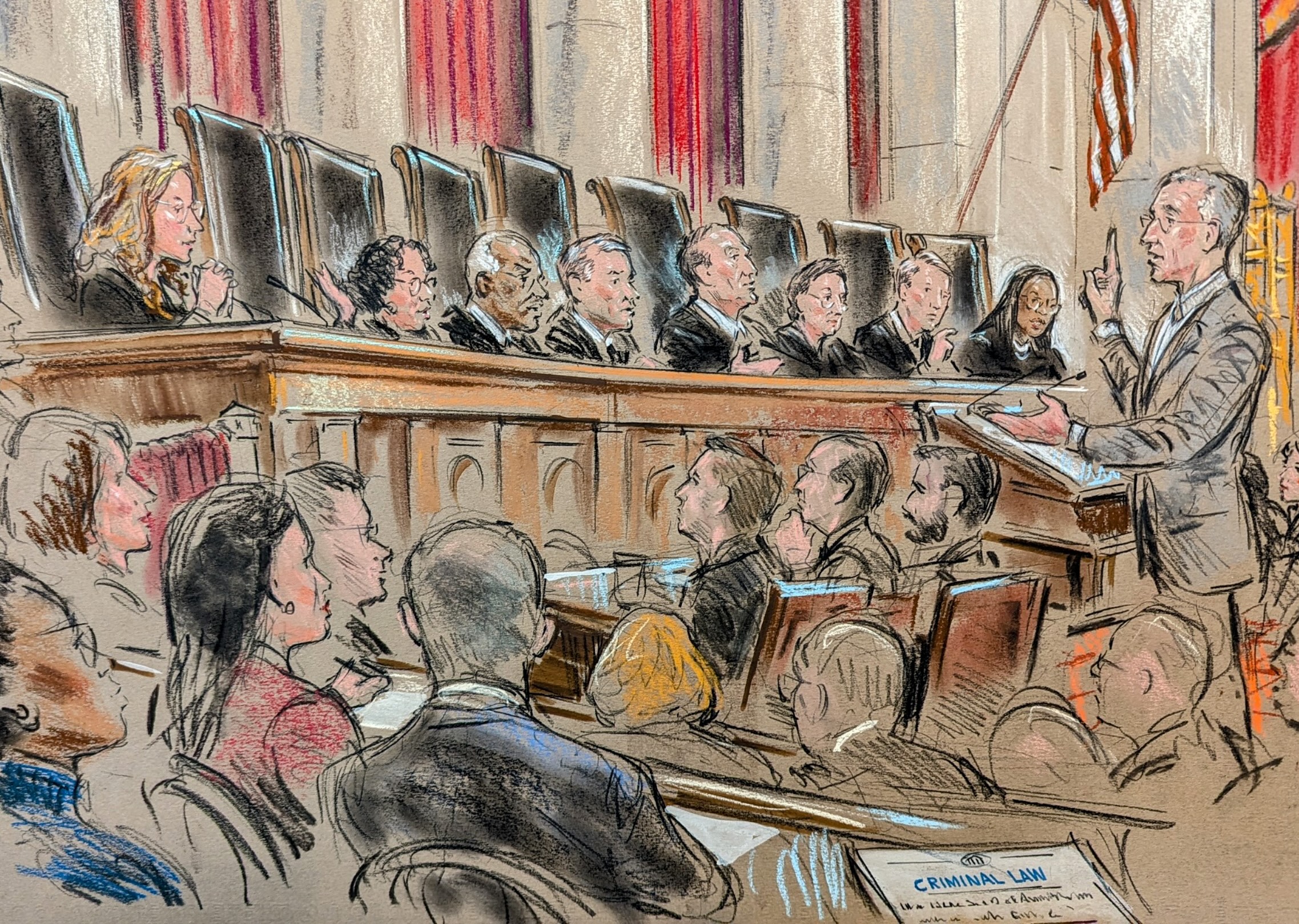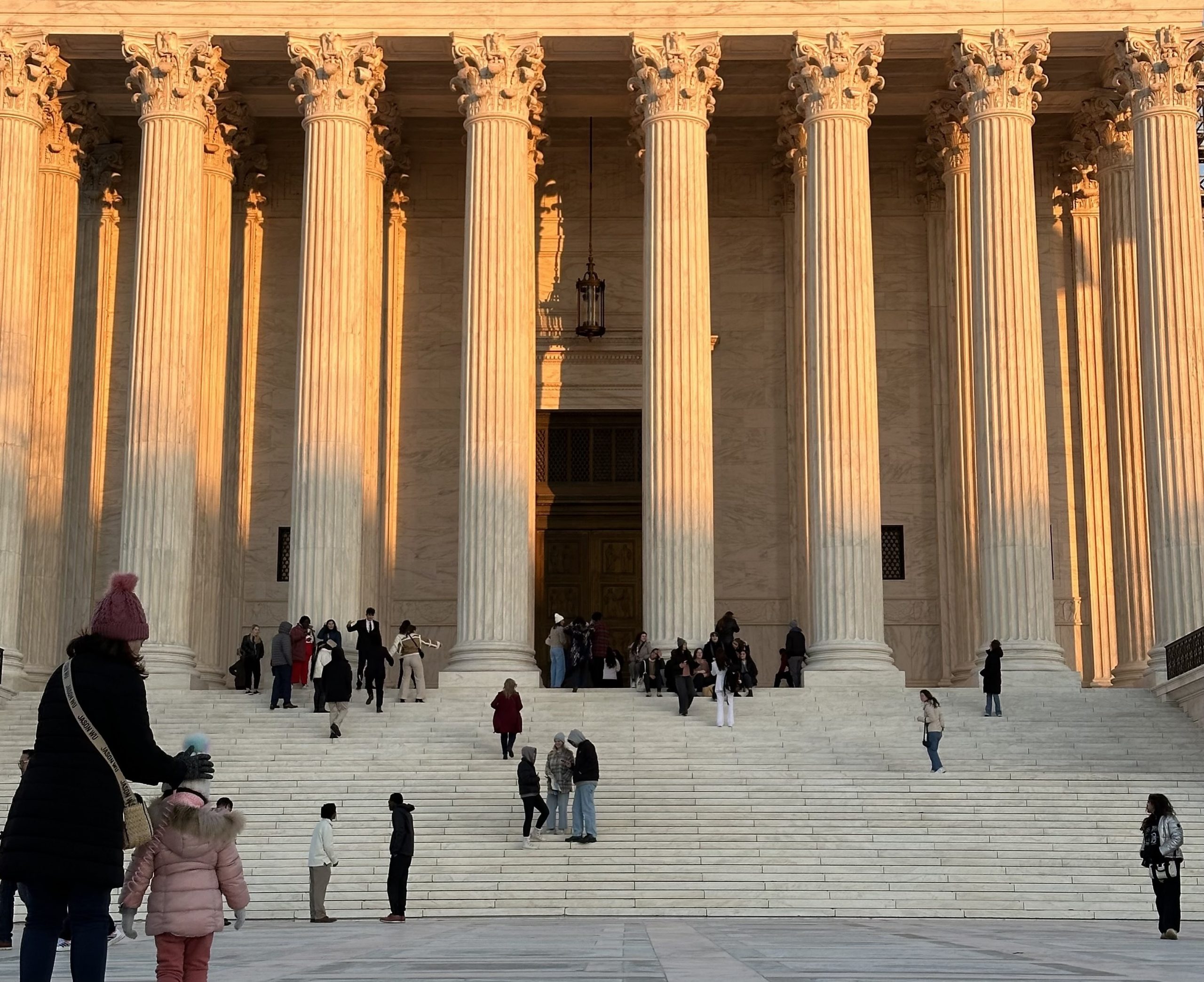No clear decision as justices debate Richard Glossip’s death sentence
ARGUMENT ANALYSIS
Last year’s order putting Richard Glossip’s execution on hold to give the Supreme Court more time to consider his appeals would have required the votes of at least five justices, though which justices voted to take up the case was not made public. Glossip needs five votes to win his appeal to overturn his conviction and death penalty. Gentner Drummond, Oklahoma’s Republican Attorney General, supports the request for a new court trial. After nearly two hours of oral argument on Tuesday, it was not clear where the five votes in support of Glo Justin Sneed confessed to beating Barry Van Treese while on meth. Sneed testified Glossip had paid him to kill Van Treese. In exchange for his testimony, prosecutors promised Sneed that he himself would not face the death penalty.
Glossip has maintained his innocence for the nearly three decades he has been on Oklahoma’s death row. He sought to have his conviction overturned and sentence thrown out again last year. He claimed that the state had, for the first time, given him files in 2023 that indicated that Sneed claimed that he was accidentally prescribed the drug to treat a cold. Prosecutors also did not correct Sneed’s false testimony that he had never been treated by a psychiatrist.
Two different independent reports questioned the validity of Glossip’s conviction and death sentence. In June 2022, a 259-page report by a law firm hired by state legislators found “grave doubt as to the integrity of Glossip’s murder conviction and death sentence.” And after 600 hours of work Rex Duncan, a former district attorney and Republican legislator hired by Drummond, reported that he believed a new trial was necessary because Glossip had been deprived of a fair trial.
Duncan’s report prompted Drummond to join Glossip’s request for the Oklahoma Court of Criminal Appeals, the state’s highest court for criminal cases, to set aside his conviction, as well as his plea for clemency from the state’s Pardon and Parole Board.
The court and the board both rejected Glossip’s requests for relief. The Supreme Court agreed to halt his execution and to hear his case earlier this year. The Oklahoma Court of Criminal Appeals ruled that Glossip’s claims were barred by )
Representing Drummond, former U.S. solicitor general Paul Clement agreed. He pointed to a “hundred years of unbroken practice” of states waiving the right to rely on procedural bars that might otherwise prevent a case from going forward.
Christopher Michel, a former assistant to the U.S. solicitor general and a former law clerk to Chief Justice John Roberts, who was appointed by the court to defend the state court’s ruling after Oklahoma declined to do so, disputed whether the state had in fact waived its right to rely on the law. Michel, however, rejected the idea that Oklahoma courts had a longstanding tradition of accepting waivers. He Justice Amy Coney Barrett questioned this approach and said that she “wonders what the right sampling She told Michel the state court’s discussion of whether Glossip should have raised his claims earlier Then, it says that the State’s concession was wrong in law. Then it goes on to tell you about the procedural bar. Then it goes back to the merits again.” And “it’s a high bar,” she emphasized, “to say that something is independent.” “We do not give that benefit of the doubt to the state,” she concluded.
But Justice Samuel Alito was more sympathetic to Michel’s argument. He pointed out that the state court indicated that even if Glossip’s claim “over Why, Alito asked, wouldn’t that be a clear statement that the state court’s ruling rested on adequate and independent state grounds?
Glossip’s lawyer, former U.S. solicitor general Seth Waxman, responded that the same decision then discussed the merits of Glossip’s claim that prosecutors had violated the Supreme Court’s 1963 decision in Brady v. Maryland, which requires them to turn over any evidence that is favorable to the defendant and could affect the decision about guilt or punishment. Alito appeared unmoved.
Glossip contends that prosecutors violated not only Brady but also the court’s 1959 decision in Napue v. Illinois, holding that if prosecutors obtain a conviction using what they know is false testimony, the conviction must be set aside if there is “any reasonable likelihood” that the false testimony could have affected the jury’s decision.
Chief Justice John Roberts, however, appeared skeptical. He asked Waxman whether it would have actually made a difference if the jury had known that Sneed had received lithium from a psychiatrist, rather than from some other physician.
Waxman stressed that there were other problems as well, including that Sneed “lied and was allowed to lie when he said that he never saw a psychiatrist,” that “very well could have made a significant difference in the outcome of the case.” Sotomayor cut him off, directing him to his side’s own point – that what mattered was not the drug but the bipolar diagnosis that the jury didn’t know about, which the drug was meant to treat. The bipolar disorder and the possibility of related violent behavior, Sotomayor emphasized, was evidence that “would have explained the murder.”
Justice Brett Kavanaugh appeared somewhat open to Glossip’s argument, telling Michel that he was “having some trouble” with Michel’s argument that it wouldn’t have mattered to the jury if it had known that Sneed was bipolar and had testified falsely, “when the whole case depended” on Sneed’s credibility. Would it make a conviction more likely, Kavanaugh asked, if the jury knew that Sneed lied on the stand and suffered from bipolar disorder, “creating all sorts of avenues for questioning his credibility”?
Michel answered that Glossip had made a strategic decision not to raise arguments about Sneed’s mental health. And in any event, with “lots of other evidence” implicating Glossip that did not involve Sneed, Michel said, “it’s difficult to say the jury would have rejected” Glossip’s “central defense” that he was not involved in the murder itself “and yet turned around and accepted it if only it knew that Justin Sneed allegedly saw a psychiatrist.”
Clement countered that if a key witness lies on the stand, there is a “reasonable probability” of a different result, including because it undermines that witness’s credibility. Psychiatric experts could have testified about Sneed’s propensity to act violently and impulsively, Clement suggested.
Alito and Justice Clarence Thomas both questioned whether Glossip and the state were reading too much into the prosecutors’ notes that, they say, supports their allegations that prosecutors knew but failed to disclose that Sneed had been prescribed lithium by a psychiatrist for bipolar disorder after his arrest.
Both justices characterized the notes – which contain the phrase “on Lithium?” and a reference to a “Dr. Trumpet” (when the psychiatrist’s name was Dr. Trompka) – as “cryptic.” Alito told Waxman that a “friend of the court” brief filed by Van Treese’s family provides a “pretty compelling” counternarrative to explain the notes, while Thomas told Clement that he “couldn’t make heads or tails” of the handwritten notes.
And Thomas expressed broader concerns that the prosecutors originally involved in Glossip’s case believe that they have been “frozen out” of the process, without being provided an “opportunity to give detailed accounts of what those notes meant and what they did during the trial.” “It seems,” he added, “as though their reputations are being impugned.”
Clement pointed to the two independent investigations, conducted by Duncan and the law firm Reed Smith. Jackson, noting that there are “pretty important factual questions” in the dispute, wondered al The eight-member court may be able to avoid a deadlock if Justice Neil Gorsuch is A Supreme Court decision of 4-4 would confirm the state court’s ruling.






